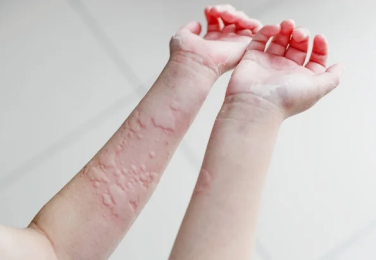Asthma / Allergy Specialist / Lung & Respiratory Specialist

At Dr. S Z Jafrey Indore Chest & Allergy Center, we provide comprehensive and advanced Skin Allergy Treatment in Indore for patients suffering from Urticaria. As a well-known Allergy Specialist in Indore, Dr. Jafrey ensures accurate diagnosis and effective long-term management for different types of allergic skin conditions. Our aim is to reduce symptoms, prevent flare-ups, and enhance your overall quality of life through personalized care.
Urticaria, or hives, is a skin allergy disorder that causes red, itchy welts across the body. These welts may appear suddenly, change shape, and disappear within hours. Many patients seek Skin Allergy Treatment in Indore because Urticaria can significantly impact sleep, comfort, and daily routine. With guidance from an experienced Allergy Specialist in Indore, most cases can be controlled effectively.

Our center focuses on early identification and holistic Skin Allergy Treatment in Indore for better symptom relief.
Urticaria occurs when certain cells in the skin release histamine and other chemicals into the bloodstream Understanding triggers is a key part of effective Skin Allergy Treatment in Indore. Common triggers include:
At Dr. S Z Jafrey Indore Chest & Allergy Center, we use a thorough approach to diagnose and treat urticaria, ensuring relief and preventing recurrence. This systematic approach ensures precise Skin Allergy Treatment in Indore with long-lasting results.
Urticaria can disrupt work, sleep, and confidence due to persistent itching and discomfort. Many people experience sudden flare-ups that interfere with their daily routine. With specialized Skin Allergy Treatment in Indore, symptoms can be brought under control, improving emotional well-being and restoring productivity. Early consultation with an Allergy Specialist in Indore helps prevent complications such as chronic swelling, repeated outbreaks, and skin sensitivity.
Dr. Jafrey is a leading Allergy Specialist in Indore with extensive experience in handling complex allergic skin conditions. His method focuses on root-cause identification, personalized treatment, and long-term prevention. Patients seeking reliable Skin Allergy Treatment in Indore trust his evidence-based and patient-friendly approach for successful outcomes.
1. What is the best Skin Allergy Treatment in Indore for Urticaria?
The best treatment includes antihistamines, avoiding triggers, lifestyle changes, and in chronic cases, biologic therapy. An experienced Allergy Specialist in Indore determines the right combination based on symptoms.
2. Can chronic Urticaria be cured with Skin Allergy Treatment in Indore?
While chronic Urticaria may not be permanently cured, symptoms can be controlled effectively with proper evaluation and treatment from an Allergy Specialist in Indore.
3. What tests are needed for Skin Allergy Treatment in Indore?
Skin prick tests, IgE blood tests, and autoimmune screening may be done to identify triggers. These tests help an Allergy Specialist in Indore design an accurate treatment plan.
4. When should I see an Allergy Specialist in Indore for Urticaria?
If your hives last longer than 24 hours, recur frequently, or cause swelling of the eyes or lips, you should consult a trained Allergy Specialist in Indore for a detailed assessment and Skin Allergy Treatment in Indore.
5. Is Urticaria dangerous, and does Skin Allergy Treatment in Indore help?
Most cases are mild, but severe swelling and breathing difficulty require urgent care. Timely Skin Allergy Treatment in Indore greatly reduces the risk of complications.
174 ED Eastern Ring Road (Between Robot and Khajrana Square) Indore
MP, India – 452016
Telephone:
0731-4064786 (10am-6pm IST)
Sunday and Major Holidays Closed
Pharmacy No: +91 8889777277
Appointment No: +91 8889777077
Emergency No: +91 9300001393